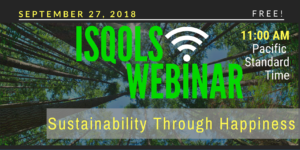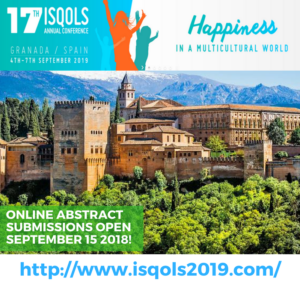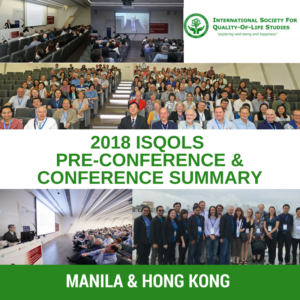- » Homepage
- » Blog
- » 2019 ISQOLS Best PhD Dissertation Award on Quality of Life, Well-being, and Happiness
Do you have some ISQOLS-related news, event announcement or reading recommendation you want to see published? Even as a non-member, you can post it directly to our site.
» Create news entry
2019 ISQOLS Best PhD Dissertation Award on Quality of Life, Well-being, and Happiness
The International Society for Quality of Life Studies (ISQOLS) calls for nominations for the “2019 ISQOLS Prize for the Best Dissertation on Quality-of-Life, Well-being, and Happiness.” The deadline for nominations is December 31st, 2018 (31/12/2018).
The aim of the prize is to promote the activity of young researchers working on quality-of-life, happiness, and well-being issues. All dissertations that have been successfully defended during the two calendar years prior to the award deadline are eligible for consideration. Resubmissions of unsuccessful nominations from prior years are welcome, as long as the dissertation defense date remains within the period of eligibility. Dissertations must be written in English.
The member student’s advisor or the scholar most familiar with the student’s research must send the nomination. Nominations must be sent via email to office@isqols.dreamhosters.com with the title “Dissertation Award Nomination” in the subject line. The deadline for the submission is December 31st, 2018 (31/12/2018).
The nomination letter should be written in English and it should include the following information:
- The title and abstract of the dissertation;
- The name of the candidate;
- The name of the candidate’s primary advisor;
- The name of the institution where the dissertation was defended;
- The date of the dissertation defense;
- A two page summary of the significance of the dissertation research. Nominations should explain the precise nature and merits of the work.
- An electronic copy of the full dissertation in Word or .pdf format;
- A list of publications produced from the dissertation work.
ISQOLS awards the best dissertation with a lump sum of $1,500 USD, one-year free membership to ISQOLS, one-year free access to the journal Applied Research in Quality of Life Studies, and free registration to the 17th ISQOLS conference that will be held in Granada (Spain) from the 4th to the 7th of September 2019.
To further promote the research on quality-of-life, well-being, and happiness, ISQOLS may award up to five second best candidates who will receive a lump sum of $300 USD, one-year free membership to ISQOLS, one-year free access to the journal Applied Research in Quality of Life Studies, and free registration to the 17th ISQOLS conference.
The submissions will be reviewed by a committee chaired by ISQOLS’s Vice-President of Academic Affairs.
Successful candidates will receive their prizes at the concluding ceremony of the 17th ISQOLS conference. They are expected to present a summary of their work during a special session of the conference. Successful candidates are also expected to acknowledge ISQOLS in their publication.
Winners will be notified by March 30th, 2019.
Register for FREE ISQOLS Webinar: “Sustainability Through Happiness” 9/27, 11am PST
|
|||||||||||
|
|||||||||||
|
|||||||||||
|
|||||||||||
|
|||||||||||
|
|||||||||||
|
|||||||||||
|
ISQOLS 2019 Conference in SPAIN: ABSTRACT SUBMISSIONS OPEN!
|
||||||||||||||||||||||||||||||||||||||||||||||||||||||||||||||||||||||
|
CALL FOR CHAPTER PROPOSALS for “Linking Sustainability and Happiness: Theoretical and Applied Perspectives”
CALL FOR CHAPTER PROPOSALS
for
Linking Sustainability and Happiness: Theoretical and Applied Perspectives
Contracted with Springer Nature, www.springernature.com, the book will present both applied and theoretical perspectives linking sustainability and happiness. The volume will offer critical discussion, constructive insights and informed guidance for future research and applied work that can move us closer toward a sustainable future. We will open the book with a critical review of environmental, social, and economic sustainability theories and happiness principles. We will also include an overview of the biological underpinnings of happiness, mainly focused on subconscious actions that promote our own fitness. The book will then include two major parts where authors can contribute, as detailed below, followed by a concluding section.
This edited volume with all new material is planned at 12-16 chapters of original work. Chapter authors are invited from around the globe, providing a variety of theories, practices, and perspectives. There are two major parts to the volume: Part I – theories and methodologies that link sustainability and happiness (e.g., participatory research, quality of life research, sustainable development theories, asset-based community development, spirituality perspectives, and emerging theories on sustainable community development and happiness, community well-being, integrative medicine and happiness, and beauty and happiness); and Part II – applied practices meant to promote greater opportunities for happiness on the ground. Practices should also focus on simultaneously promoting sustainability. Many examples and experiences are welcomed.
Proposals are sought for all sections. Please submit your chapter proposal to me at: Scott.Cloutier@asu.edu. Proposals should include: (1) your proposed title; (2) an abstract of no more than 500 words; (3) section preference (Part I or II); (4) format type – whether short essay of up to 2500 words, or chapter length from 2500 – 8000 words; (5) your contact information; and (6) a short ½ page biography. The format for the volume will be APA style. Anticipated publication date is 2019. The due date for proposals is September 15, 2018 (decisions on proposals will be sent by October 1, 2018 with full chapters due by December 1, 2018). Chapter authors receive a copy of the book, once published. Please reach out with questions.
Scott Cloutier, Ph.D.
Assistant Professor, School of Sustainability
Arizona State University, Tempe, AZ 85282
P: (603) 285-2296 E: Scott.Cloutier@asu.edu
DUE DATE FOR PROPOSALS SEPTEMBER 15TH, 2018
2018 Impact Summit, September 17 & 18
If you use data to improve community conditions, join us Sept. 17 & 18 in Minneapolis at the 2018 Impact Summit. Our focus is on making data accessible, credible and actionable with and for the community. The 2018 Impact Summit boasts some of the field’s most influential presenters, panels and interactive workshops in a forum designed to be conducive to the sharing of ideas, learning of new concepts and meeting new connections. Concurrent tracks will discuss Data tools, Data to action, Measuring, Engaging the community, Sustaining your work.
Attendees are program managers, data analysts, communications folks, researchers and students from nonprofits and foundations, research institutions and consulting firms, government and academia. More information: http://communityindicators.net/conferences/2018-impact- summit/
ISQOLS 2018 Pre-Conference & Conference Summary
The inaugural ISQOLS pre-conference site visit took place June 12th at the Social Weather Stations headquarters in Manila, Philippines and the 2018 ISQOLS Annual Conference was held at the Hong Kong Polytechnic University from June 13th-June 16th. Click here to read the summaries of these two events!
Self-knowledge by knowing others
The holding of last week’s 2018 conference of the International Society for Quality of Life Studies in nearby Hong Kong made it feasible for five persons from Social Weather Stations to attend. My paper (“The Social Weather Reports of economic well-being in the Philippines”) was about the SWS surveys, but my colleagues all used the World Values Survey (WVS), on topics of their personal interest, different from their office assignments.
The 2010-14 wave of the WVS, of which SWS is a member, was done in 60 countries. SWS fielded it in the Philippines in 2012. The WVS waves have very lengthy, multi-topic questionnaires, and are stand-alone projects; their data are freely open to researchers (www.worldvaluessurvey.org).
For me, the value of cross-country surveys is not so much learning more about other nationalities of the world, as understanding us Filipinos in particular, by discovering our similarities to and differences from others. One should not presume to know these things from introspection alone. One should rely on data.
We Filipinos have relatively few social biases. Relatively few Filipinos dislike having neighbors who are: of a different language (31 percent), homosexuals (28), of a different race (22), unmarried couples living together (22), of a different religion (16), or immigrants (14). The three groups we dislike as neighbors are: drug addicts (96), people with AIDS (75), and heavy drinkers (69).
In contrast are Malaysians, who dislike six of the above as neighbors: drug addicts (74), heavy drinkers (68), immigrants (60), people with AIDS (60), homosexuals (59), and unmarried couples living together (52).
We have a relatively low regard for other religions. We mostly-Christian Filipinos agree with the statement, “The only acceptable religion is my religion,” by the substantial net score of +34. In this we are similar to the mostly-Muslim Malaysians (net +37).
On the other hand, the mostly-Hindu Indians (net +2) and the mostly-Buddhist Thais (net -3) are evenly divided. All other Asians deny that other religions are unacceptable: Japanese (net -27), Chinese (net -33), Singaporeans (net -50), Koreans (net
-52), and Taiwanese (net -69).
Interestingly, Mexicans (net -17) are more tolerant than we are, and Spaniards (net -45) are even more tolerant. Religious tolerance developed differently in the Philippines, Mexico and Spain, despite the trio’s historical Christian connection.
58 percent of Filipinos are interested in politics. That is above the 44 percent of Malaysians but below the 75 percent of Thais.
Fewer Filipinos than Thais have ever joined or might someday join in signing a petition, in attending a peaceful demonstration, in a boycott, and in a strike.
Filipinos are the only Asians that feel that respect for the elderly continues. The Philippines has the most youthful population in Asia, with only 8 percent aged 60+ (versus 33 in Japan). On the statement, “older people are not much respected these days,” all Asians agree, most of all Japanese (net +48) and South Koreans (net +64). Filipinos are the only ones that disagree (net -15).
Many more discoveries are possible. Survey data don’t get depleted from use.
The SWS staff at ISQOLS were: Vladymir Licudine, “Exploring the Effects of Religion and Religiosity on Social Acceptance in Asian Nations”; Christine Torres, “Religious Tolerance among Selected Asian and Western Countries”; Michael Entoma, “Interest in Politics and Political Participation in the Philippines and Southeast Asia”; and Sheena Sabio, “Perceptions of the Elderly: Variations among Southeast and East Asian Countries.”
Contact mahar.mangahas@sws.org.ph.
Applied Research in Quality of Life: Call for Papers for a Special Conference Issue
Call for Papers for a Special Conference Issue
A publishing opportunity for participants in the 2018 ISQOLS Conference (“Promotion of Quality of Life in the Changing World”)
Applied Research in Quality of Life is the official Journal of the International Society for Quality of Life Studies (www.isqols.dreamhosters.com).
Special issue(s) of ARQOL will be compiled from papers presented at the 2018 ISQOLS conference. The conference theme is “Promotion of Quality of Life in the Changing World”. While special issue(s) will represent papers from across disciplines and perspectives, it is anticipated that the conference theme will be addressed as far as possible. To submit, follow the attached online instructions at (please add). When submitting your paper, please note that it is for the 2018 ISQOLS Conference Issue. For more information on the special issue for the conference, please contact Daniel Shek, Editor-in-Chief (daniel.shek@polyu.edu.hk). If you are interested in guest editing a special issue for the 2018 ISQOLS Conference based on a particular theme, please note the Instructions for publishing a special issue in ARQOL.
Instructions to Prepare a Special Issue for Applied Research in Quality of Life
- Colleagues who are interested to publish a special issue of Applied Research in Quality of Life should send a Special Issue proposal to the Editor-in-Chief. The proposal should contain the following information:
- A brief introduction about the Guest Editor(s) and the related CV(s)
- Scope and objectives of the Special Issue
- Proposed papers in the Special Issue
- Proposed time line
- Once approval is given by the Editor-in-Chief, the Guest Editor(s) may start inviting submission for the Special Issue.
- Each paper should be reviewed by at least TWO independent referees invited by the Guest Editor(s). The Guest Editor(s) will then process the manuscripts (e.g., invitation for revision, acceptance and review …etc.) according to the review reports of the reviewers.
- For each paper, the author must ask a native English speaking editor to edit the English of the final version of the paper.
- ARQOL only publishes papers with high academic quality. As such, the Guest Editor(s) should ensure that the papers accepted should meet the international standard and they are on par with papers published in the regular issues of ARQOL.
- When the whole review process is completed, the Guest Editor(s) should submit the following items to the Editor-in-Chief:
- Final version of the manuscripts
- Reviewer reports for each paper
- Editorial decision letters (including those for revisions and acceptance)
- Once the Editor-in-Chief receives the materials in #6, he will go through the materials to ensure that the Special Issue papers are of high academic quality and the papers have been processed in a professional manner. If the quality assurance process suggests that the Special Issue has been professionally prepared and the papers are of high academic quality, the Editor-in-Chief will accept the Special Issue for publication and inform the authors accordingly.
- In 2018, the expected length of an issue is 268 pages with 14 articles (word count for each page is around 525 words). As such, the expected length of a paper is around 10,000 words. In case the number of papers is not enough, the related papers will be published as a Special Section of an issue.
INVITATION TO APPLY FOR FACULTY POSITIONS IN SOCIAL WORK The National University of Singapore (NUS)
INVITATION TO APPLY FOR FACULTY POSITIONS IN SOCIAL WORK
The National University of Singapore (NUS) is a leading university centred in Asia. It has consistently ranked among the top 30 universities in the world, and is ranked first among the universities of Asia (Times Higher Education World University Rankings, 2017). The Department of Social Work is one of the oldest Departments in the Faculty of Arts and Social Sciences (FASS), which hosts 16 Departments with a wide range of academic offerings in the Humanities, Social Sciences, Asian Studies and Language Studies. In this multi-disciplinary setting in Singapore’s flagship university, the Department of Social Work offers ample opportunities for cutting-edge curriculum and research initiatives on contemporary social work, social development and cultural diversity. The Department has a strong focus on practice and practice-based research and produces graduates who rise to be leaders in social services and social policy.
The Department seeks faculty members who can teach social work practice and have expertise in the areas of Family Social Work, Social Policy, Disability, Group and Community Work, Human Service Planning and Administration (Indirect Practice), Corrections and Rehabilitation, especially those who are keen to develop expertise in the practice frameworks and crosscultural issues relevant to the Asian region.
We invite applications for the following faculty positions:
Tenure Track
• Associate Professor
• Assistant Professor
Educator Track
• Lecturer/Senior Lecturer
We offer a competitive remuneration package, including housing and travel benefits.
Applicants for the positions must
i. Have a PhD in Social Work,
ii. Have an internationally reputed publication record, and
iii. Demonstrate an interest and ability to teach foundation and direct practice courses as well
as contribute to research and scholarship in these areas.
Applicants with a minimum of 5 years of practice experience after Bachelor’s degree (BSW) or
Master’s degree (MSW) in Social Work are preferred.
Evaluation of applications will begin after August 2018 and continue until the vacancies are
filled. Please submit: your full curriculum vitae; statements of teaching, practice, and research;
five key publications; student feedback in the last two years; and arrange for at least three
letters of reference from academic referees to be sent directly to the address below.
All documents and enquiries are to be sent to:
Ms Boo Chui Ngoh
Manager
Department of Social Work
Faculty of Arts and Social Sciences
National University of Singapore
Blk AS3, Level 4, 3 Arts Link
Singapore 117570
Tel: (65) 6516 4472
Fax: (65) 6778 1213
Email: swkbcn@nus.edu.sg
Website: http://www.fas.nus.edu.sg/swk
In memory of influential ISQOLS member, Wolfgang Zapf
One of the earliest and most influential members of our Society, Wolfgang Zapf, has passed away following a long illness.
welfare research and contributed significantly to the promising sociological approach of social monitoring. One of his colleagues remarked to Wolfgang Zapf – and many would agree: “We are grateful to you, a person with an unusual mixture of clearness, modesty and irony”. In recognition for his groundbreaking and pioneering work in
the field of social indicators and quality of life research, Wolfgang Zapf received the highest honor of the International Society for Quality of Life Studies in 2004, the Distinguished Quality of Life Researcher Award.














